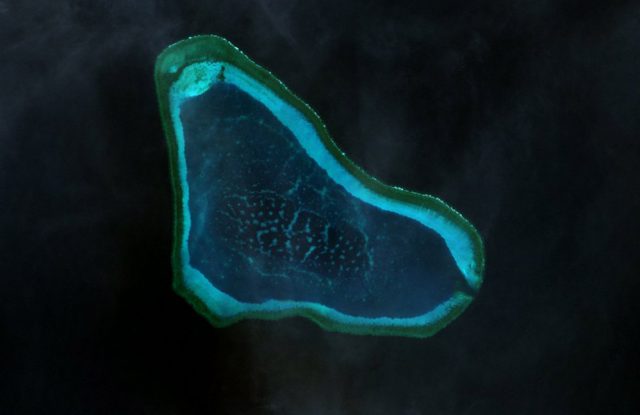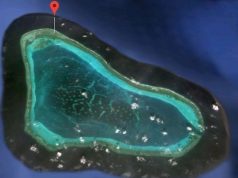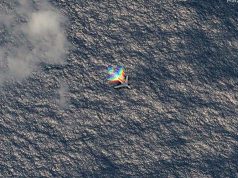In a move seen as a refusal to reinforce the maritime rights in the West Philippine Sea, Malacañang dismissed the harassment of a Filipino-manned vessel by a Chinese ship even if it happened within Philippines’ exclusive economic zone.
The vessel called Green Aura is not Filipino-owned. It came from Greece and carried a flag of Liberia. Filipino seafarers, however, comprise its crew. At the helm was Capt. Manolo Ebora, a Philippine Navy reservist with the rank of lieutenant commander.
The vessel was only supposed to be passing around Scarborough Shoal when a Chinese naval warship bullied it into changing course.
Pointing out that the ship is not Filipino-flagged, Malacañang distanced itself from incident.
Panelo said:
“Each country has the right to be protective and be concerned of the welfare of its citizens. In this case, however, there was no threat to the lives of our countrymen despite the ship captain’s engaging in retorts about an issue sensitive to our foreign relations concerning our seas. In this particular instance, invoking our state’s dominion is unnecessary.”
Panelo’s statement showed the government’s lack of concern over the country’s jurisdiction, tweeted maritime law expert Jay Batongbacal.
This is just so WRONG on several levels. When will someone stop Panelo from speaking out of turn on matters of foreign policy? /1https://t.co/YBHRv5h5B8
— Jay L Batongbacal (@JayBatongbacal) November 4, 2019
“This is like saying [the Philippines] is not concerned that [China] exercises jurisdiction over Scarborough against any other State. It’s like a person not caring that his house is being managed by someone else who claims to be the owner, and makes other people recognize he is the real owner,” Batongbacal wrote in a thread.
Batongbacal also pointed out that the Philippines’ economic activities are dependent on foreign-flagged vessels such as Green Aura.
“Only 101 ships are registered with the PH flag today; our international trade is carried by foreign ships like this one flagged with Greece,” Batongbacal said.
Sen. Panfilo Lacson, meanwhile, cited the decision of the tribunal under the United Nations Convention on the Law of the Sea in criticizing Malacañang’s nonchalance.
A Liberian ship navigating the waters within the Philippines EEZ being blocked by Chinese authorities is not our country’s concern? The Malacañang official who posited the idea should be our concern.
— PING LACSON (@iampinglacson) November 4, 2019
The landmark ruling in 2016, Scarborough or Panatag shoal is a common or international fishing ground within the Philippines’ EEZ, therefore, all vessels from other countries have the right to pass through.
The shoal is only 120 nautical miles from the coast of Masinloc, Zambales.
This decision at The Hague also disproved China’s nine-dash line map which claimed nearly all disputed waters in the South China Sea.
The captain speaks
The ship’s right to pass through was what Capt. Ebora invoked when he spoke with the Chinese crew who radioed them on the night of September 30.
The Chinese crew introduced themselves as a naval ship before requesting them to alter their course.
To this, Ebora responded via a video: “Why should I alter my course? We are [making] innocent passage.”
“This is Scarborough Shoal. It’s not [Huangyan Dao]. We are just passing. May I know, is this Chinese territory water? I think it’s not Chinese [territorial] water,” he said.
When the video made rounds online, Filipinos congratulated Ebora for his bravery against Chinese, which contrasts with the governemnt’s toned down statements.
That took a lot of balls, Captain Manolo "Noli" Ebora! You risked your life and that of the other 22 Filipinos in your ship but you didn't budge.
"Masakit. Sarili mong bansa, itataboy ka?"
You are more 🇵🇭 than those who occupy the palace. Mabuhay ka! May your tribe increase! https://t.co/HVhDu8qIYC
— J O J I (@JojiCL) November 3, 2019
Green Aura’s Electronic Chart Display and Information System detected four Chinese Coast Guard vessels near Scarborough shoal, Ebora recalled, following a four-day sea travel before reaching Philippine waters.
They came from Nongyao, Thailand on the way to Longkou, China when they took the coarse through the shoal to verify reports of Chinese presence there.
The sketchy flag of convenience practice
Panelo also cited that the tanker was carrying a Liberian “flag of convenience.”
“We cannot deprive the country being represented by the oil tanker of its right and duty to protect its own ship. To do otherwise, will be effectively divesting such country of its right and competence to take the cudgels for its ship. Such a demeanor will be a disrespect to it and even insulting to the capability of that country to assert its right,” Panelo said.
Carrying a flag of convenience is a business practice where ships are registered, operated and taxed in another country to save money.
This is mostly done by cruise ships to prevent financial accountability from their home countries.








